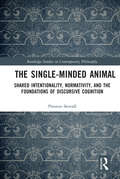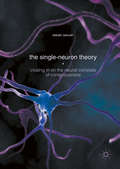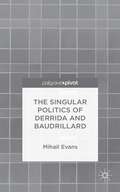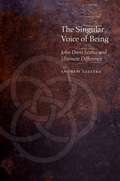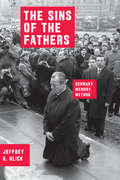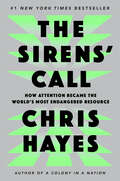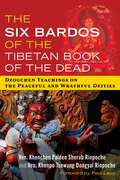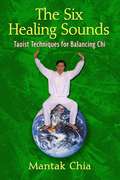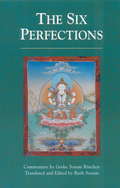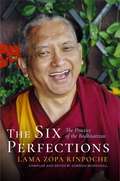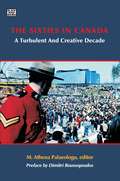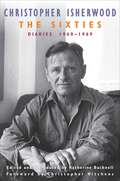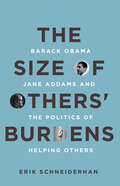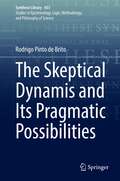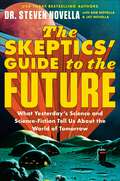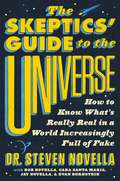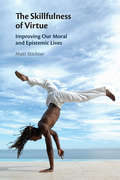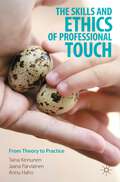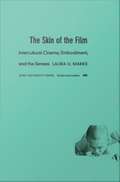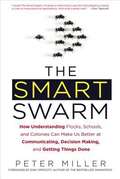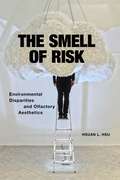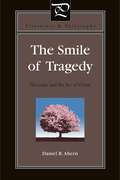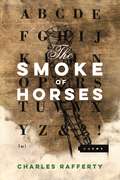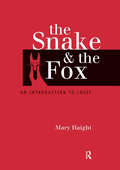- Table View
- List View
The Single-Minded Animal: Shared Intentionality, Normativity, and the Foundations of Discursive Cognition (Routledge Studies in Contemporary Philosophy)
by Preston StovallThis book provides an account of discursive or reason-governed cognition, by synthesizing research in the philosophy of language, the philosophy of mind, and evolutionary anthropology. Using the grasp of a natural language as a model for the autonomous or self-governed rationality of discursive cognition, the author uses a semantics for individual intentions, shared intentions, and normative attitudes as a framework for understanding what it is to be a rational animal. This semantics interprets claims about shared intentions and claims about what people ought and may do as the expression of plans of action that involve taking the points of view of other people within a community. This has important consequences for our understanding of both the natural basis and the social relevance of intentional and normative mental states. In order to distinguish the strong and weak modal force, which characterizes normativity but not shared intentionality, the author argues that a notion of single-minded practical cognition is necessary. This account of single-mindedness is then used to shed light on the autonomy or self-government characteristic of discursive cognition, as manifest in a linguistic community whose members are able to adopt the standpoints of others. Drawing together research in philosophy and the related sciences, the formal account of the semantic content of the claims we use to give expression to shared intentional and normative mental states integrates well with research in cognitive science, evolutionary anthropology, and social psychology concerning the ontogenetic and phylogenetic development of shared intentionality and norm psychology in human beings and other primates. The Single-Minded Animal will appeal to researchers and advanced students working on shared intentionality, normativity, rationality, cognitive science, social and developmental psychology, and evolutionary anthropology.
The Single-Neuron Theory
by Steven SevushThis book presents an engaging account of a provocative new theory which explores how our brain generates conscious experience and where this occurs. It suggests that conscious experience happens not at the whole brain level but at the level of individual nerve cells. The notion that the brain as a whole is sentient is an illusion created by the exquisite organization of the individually conscious neurons. Despite appearances to the contrary, conscious behavior that seems to be the product of a single macroscopic mind is actually the integrated output of a chorus of microscopic minds, each associated with an individual neuron. The result is a theory that revolutionizes our conception of who and what we are.
The Singular Politics of Derrida and Baudrillard
by Mihail EvansRecent years have seen the rise of anti-politics as a political phenomenon. Beyond this new rejection of the political class there has long existed a deeper challenge to the political itself. Identifying the work of Derrida as 'a politics' and that of Baudrillard as 'transpolitics' this book charts convergences and divergences in their approaches.
The Singular Voice of Being: John Duns Scotus and Ultimate Difference (Medieval Philosophy: Texts and Studies)
by Andrew T. LaZellaThe Singular Voice of Being reconsiders John Duns Scotus’s well-studied theory of the univocity of being in light of his less explored discussions of ultimate difference. Ultimate difference is a notion introduced by Aristotle and known by the Aristotelian tradition, but one that, this book argues, Scotus radically retrofits to buttress his doctrine of univocity. Scotus broadens ultimate difference to include not only specific differences, but also intrinsic modes of being (e.g., finite/infinite) and principles of individuation (i.e., haecceitates). Furthermore, he deepens it by divorcing it from anything with categorical classification, such as substantial form. Scotus uses his revamped notion of ultimate difference as a means of dividing being, despite the longstanding Parmenidean arguments against such division. The book highlights the unique role of difference in Scotus’s thought, which conceives of difference not as a fall from the perfect unity of being but rather as a perfective determination of an otherwise indifferent concept. The division of being culminates in individuation as the final degree of perfection, which constitutes indivisible (i.e., singular) degrees of being. This systematic study of ultimate difference opens new dimensions for understanding Scotus’s dense thought with respect to not only univocity, but also to individuation, cognition, and acts of the will.
The Sins of the Fathers: Germany, Memory, Method
by Jeffrey K. OlickNational identity and political legitimacy always involve a delicate balance between remembering and forgetting. All nations have elements in their past that they would prefer to pass over--the catalog of failures, injustices, and horrors committed in the name of nations, if fully acknowledged, could create significant problems for a country trying to move on and take action in the present. Yet denial and forgetting carry costs as well. Nowhere has this precarious balance been more potent, or important, than in the Federal Republic of Germany, where the devastation and atrocities of two world wars have weighed heavily in virtually every moment and aspect of political life. The Sins of the Fathers confronts that difficulty head-on, exploring the variety of ways that Germany's leaders since 1949 have attempted to meet this challenge, with a particular focus on how those approaches have changed over time. Jeffrey K. Olick asserts that other nations are looking to Germany as an example of how a society can confront a dark past--casting Germany as our model of difficult collective memory.
The Sirens' Call: How Attention Became the World's Most Endangered Resource
by Chris HayesFrom the New York Times bestselling author and MSNBC and podcast host, a powerful wide-angle reckoning with how the assault from attention capitalism on our minds and our hearts has reordered our politics and the very fabric of our society. <p> We all feel it—the distraction, the loss of focus, the addictive focus on the wrong things for too long. We bump into the zombies on their phones in the street, and sometimes they’re us. We stare in pity at the four people at the table in the restaurant, all on their phones, and then we feel the buzz in our pocket. Something has changed utterly: for most of human history, the boundary between public and private has been clear, at least in theory. <p> Now, as Chris Hayes writes, “With the help of a few tech firms, we basically tore it down in about a decade.” Hayes argues that we are in the midst of an epoch-defining transition whose only parallel is what happened to labor in the nineteenth century: attention has become a commodified resource extracted from us, and from which we are increasingly alienated. The Sirens’ Call is the big-picture vision we urgently need to offer clarity and guidance. Because there is a breaking point. <p> Sirens are designed to compel us, and now they are going off in our bedrooms and kitchens at all hours of the day and night, doing the bidding of vast empires, the most valuable companies in history, built on harvesting human attention. As Hayes writes, “Now our deepest neurological structures, human evolutionary inheritances, and social impulses are in a habitat designed to prey upon, to cultivate, distort, or destroy that which most fundamentally makes us human.” <p> The Sirens’ Call is the book that snaps everything into a single holistic framework so that we can wrest back control of our lives, our politics, and our future. <b>New York Times Bestseller</b>
The Six Bardos of the Tibetan Book of the Dead: Dzogchen Teachings on the Peaceful and Wrathful Deities
by Ven. Khenchen Palden Sherab Rinpoche Ven. Khenpo Tsewang Dongyal Rinpoche• Shares ancient Tibetan wisdom to help readers break through the process of &“ego-clinging&” to find deeper freedom and escape from feelings of lack and scarcity• Offers authentic guidance and support for confidence in overcoming challenges, bravery in caring for the self and others, as well as fearlessness in the face of dying• Examines key concepts and history in Dzogchen Buddhism, including a guide to the Vajrayana teachings, the Bardo teachings, and the role of the five elementsAccording to the Buddha, all sentient beings are naturally enlightened and have been pure since the beginning. However, in waking life, grasping and fear develop into ego-clinging and a cyclic state of delusion. This interval from the beginning of delusion until we return to our primordial nature is known as the bardo. Until we rediscover enlightenment, everything we feel, know, and experience is bardo phenomena.Exploring this understanding, so essential to the myriad schools of Buddhism, in rich and practical detail, renowned Dzogchen masters Ven. Khenchen Palden Sherab Rinpoche and Ven. Khenpo Tsewang Dongyal Rinpoche offer a guide to implementing the teachings of the bardos of life and death from the Bardo Thodrol, commonly known as The Tibetan Book of the Dead. Drawing on their Dzogchen background—a Buddhist lineage focused on resting and abiding in our true nature—the authors explore key ideas from the famous Tibetan text, including the Vajrayana teachings, the five elements, peaceful and wrathful deities, and the nature of the six bardos (with particular emphasis on the bardo of dying). The authors provide practical advice for deeper self-awareness, improved care of the self and others, and confronting challenges fearlessly, especially the process of dying.The teachings offered by the authors in this guide are truly universal, offering a path out of delusion and allowing us all to &“ignite our inner light&” and rediscover our inner buddha nature as we move forward on the path to enlightenment.
The Six Healing Sounds: Taoist Techniques for Balancing Chi
by Mantak ChiaThe Six Healing Sounds that keep the vital organs in optimal condition • Presents vocalizations and accompanying postures that dissolve the tensions at the root of unhealthy chi flow and organ malfunction • Shows how to release excess heat trapped around the organs and redistribute it to cooler regions of the body to bring balance, health, and calmness to the entire system Thousands of years ago Taoist masters discovered that a healthy organ vibrates at a particular frequency. They found six sounds with the correct frequencies to keep each organ in optimal condition. To accompany these Six Healing Sounds, six postures were developed to activate the acupuncture meridians, or energy channels, of the corresponding organs. In The Six Healing Sounds Master Mantak Chia explains how the pressures of modern life can cause excess heat to become trapped around the organs, causing energy blockages and sickness. He shows readers how the vibrations of the Six Healing Sounds and their accompanying postures redistribute this excess heat to the cooler regions of the body, thereby stimulating and balancing chi energy and restoring the vital organs. Regular practice of the Six Healing Sounds promotes optimal health for the organs, increased sexual pleasure, emotional balance, and the prevention of illness.
The Six Perfections
by Geshe Sonam Rinchen Ruth SonamThe Six Perfection (generosity, ethical discipline, patience, enthusiastic effort, concentration, and wisdom) are practiced by Bodhisattvas who have the supreme intention of attaining enlightenment for the sake of all living beings.
The Six Perfections: The Practice of the Bodhisattvas
by Lama Zopa RinpocheA practical and actionable guide to the six perfections, a backbone of the Buddhist path, by an internationally beloved teacher. The six perfections are the actions of the bodhisattvas—holy beings who have transcended selfless concerns. But they&’re also skills we can and should develop right now, in our messy, ordinary lives. In this clear, comprehensive guide to the backbone of Mahayana Buddhist practice, Lama Zopa Rinpoche walks us through each of the six perfections: -charity -morality -patience -perseverance -concentration -wisdom As he carefully describes each perfection, he not only reveals the depth of its meaning and how it intertwines with each other perfection, but he also explains how to practice it fully in our everyday lives—offering concrete ways for us to be more generous, more patient, more wise. With the guidance he gives us, we can progress in our practice of the perfections until we, like the bodhisattvas, learn to cherish others above ourselves.
The Sixties in Canada
by M. Athena PalaeologuEverywhere the 1960s are being examined and debated. Universities hold international conferences that bring together scholars and activists. Very little has been published about the sixties in Canada, however. This anthology is meant to close that gap. The essays in this volume reflect a minefield of research material that has been brought together from a rich reservoir of sources, heretofore little known.Contributors include Bryan Palmer, Jonathan Thompson, Anne Hoefnagels, Pat Smart, Sean Mills, Gillian Helfield, Myrna Kostash, John Cleveland, Paul Jackson, Carrie Dickenson, Eric Morton, Barbara Goddard, Laurence Davis, Kristin Ireland, Chris Harris, Kevin Brushett, and Dimitrios Roussopoulos.
The Sixties: Diaries 1960–1969
by Christopher IsherwoodThis second volume of Christopher Isherwood's remarkable diaries opens on his fifty-sixth birthday, as the fifties give way to the decade of social and sexual revolution. Isherwood takes the reader from the bohemian sunshine of Southern California to a London finally swinging free of post-war gloom, to the racy cosmopolitanism of New York and to the raw Australian outback. He charts his ongoing quest for spiritual certainty under the guidance of his Hindu guru, and he reveals in reckless detail the emotional drama of his love for the American painter Don Bachardy, thirty years his junior and struggling to establish his own artistic identity.The diaries are crammed with wicked gossip and probing psychological insights about the cultural icons of the time—Francis Bacon, Richard Burton, Leslie Caron, Marianne Faithfull, David Hockney, Mick Jagger, Hope Lange, W. Somerset Maugham, John Osborne, Vanessa Redgrave, Tony Richardson, David O. Selznick, Igor Stravinsky, Gore Vidal, and many others. But the diaries are most revealing about Isherwood himself—his fiction (including A Single Man and Down There on a Visit), his film writing, his college teaching, and his affairs of the heart. He moves easily from Beckett to Brando, from arthritis to aggression, from Tennessee Williams to foot powder, from the opening of Cabaret on Broadway (which he skipped) to a close analysis of Gide.In the background run references to the political and historical events of the period: the anxieties of the Cold War, Yuri Gagarin's spaceflight, de Gaulle and Algeria, the eruption of violence in America's inner cities, the Vietnam War, the Summer of Love, the moon landing, and the raising and lowering of hemlines. Isherwood is well known for his prophetic portraits of a morally bankrupt Europe on the eve of World War II; in this unparalleled chronicle, The Sixties, he turns his fearless eye on the decade that more than any other has shaped the way we live now.
The Size of Others' Burdens: Barack Obama, Jane Addams, and the Politics of Helping Others
by Erik SchneiderhanAmericans have a fierce spirit of individualism. We pride ourselves on self-reliance, on bootstrapping our way to success. Yet, we also believe in helping those in need, and we turn to our neighbors in times of crisis. The tension between these competing values is evident, and how we balance between these competing values holds real consequences for community health and well-being. In his new book, The Size of Others' Burdens, Erik Schneiderhan asks how people can act in the face of competing pressures, and explores the stories of two famous Americans to develop present-day lessons for improving our communities. Although Jane Addams and Barack Obama are separated by roughly one hundred years, the parallels between their lives are remarkable: Chicago activists-turned-politicians, University of Chicago lecturers, gifted orators, crusaders against discrimination, winners of the Nobel Peace Prize. Addams was the founder of Hull-House, the celebrated American "settlement house" that became the foundation of modern social work. Obama's remarkable rise to the presidency is well known. Through the stories of Addams's and Obama's early community work, Erik Schneiderhan challenges readers to think about how many of our own struggles are not simply personal challenges, but also social challenges. How do we help others when so much of our day-to-day life is geared toward looking out for ourselves, whether at work or at home? Not everyone can run for president or win a Nobel Prize, but we can help others without sacrificing their dignity or our principles. Great thinkers of the past and present can give us the motivation; Addams and Obama show us how. Schneiderhan highlights the value of combining today's state resources with the innovation and flexibility of Addams's time to encourage community building. Offering a call to action, this book inspires readers to address their own American dilemma and connect to community, starting within our own neighborhoods.
The Skeptical Dynamis and Its Pragmatic Possibilities (Synthese Library #455)
by Rodrigo Pinto de BritoThis monograph reevaluates a school of thought concerned with truth and inquiry. It examines the critique which asserts that it's not possible to live this Early Greek philosophy in practice. The investigation also details new discoveries on the reception of Skepticism by Empiricist Doctors, Early Greek Fathers, Medieval Arabic Thinkers, and Renaissance Thinkers.The author takes a careful look at the apraxia argument and how critics used it. He shows how anti-skeptical arguments rose in different stages of the development of the Skepticism. Coverage also details how the skeptics replied and gave more pragmatic coherence to their philosophy, starting with the proto-skeptics and continuing with the works of Sextus Empiricus. Readers will learn how skepticism endured despite the criticisms, becoming a coherent response to dogmatic philosophies such as Stoicism.The investigation also analyzes the two common approaches that philosophers have used to interpret Sextan philosophy. It considers their benefits as well as defects. In the process, the author presents an original way of interpreting Sextan thought, which the author calls the “suburban interpretation”. He then applies this "middle way" to two works: Against the Grammarians and Against the Rhetoricians. Overall, the book provides readers with an insightful look at how this school of thought survived and spread throughout the ages.
The Skeptics' Guide to the Future: What Yesterday's Science and Science Fiction Tell Us About the World of Tomorrow
by Dr. Steven NovellaFrom the bestselling authors and hosts of "The Skeptics' Guide to the Universe," a high-tech roadmap of the future in their beloved voice, cracking open the follies of futurists past and how technology will profoundly change our world, redefining what it means to be human.Our predictions of the future are a wild fantasy, inextricably linked to our present hopes and fears, biases and ignorance. Whether they be the outlandish leaps predicted in the 1920s, like multi-purpose utility belts with climate control capabilities and planes the size of luxury cruise ships, or the forecasts of the &‘60s, which didn&’t anticipate the sexual revolution or women&’s liberation, the path to the present is littered with failed predictions and incorrect estimations. The best we can do is try to absorb the lessons from futurism's checkered past, perhaps learning to do a little better.In THE SKEPTICS' GUIDE TO THE FUTURE, Steven Novella and his co-authors build upon the work of futurists of the past by examining what they got right, what they got wrong, and how they came to those conclusions. By exploring the pitfalls of each era, they give their own speculations about the distant future, transformed by unbelievable technology ranging from genetic manipulation to artificial intelligence and quantum computing. Applying their trademark skepticism, they carefully extrapolate upon each scientific development, leaving no stone unturned as they lay out a vision for the future.
The Skeptics' Guide to the Universe: How to Know What's Really Real in a World Increasingly Full of Fake
by Steven Novella Bob Novella Cara Santa Maria Jay Novella Evan BernsteinAn all-encompassing guide to skeptical thinking from podcast host and academic neurologist at Yale University School of Medicine Steven Novella and his SGU co-hosts, which Richard Wiseman calls "the perfect primer for anyone who wants to separate fact from fiction."It is intimidating to realize that we live in a world overflowing with misinformation, bias, myths, deception, and flawed knowledge. There really are no ultimate authority figures-no one has the secret, and there is no place to look up the definitive answers to our questions (not even Google). Luckily, THE SKEPTICS' GUIDE TO THE UNIVERSE is your map through this maze of modern life. Here Dr. Steven Novella-along with Bob Novella, Cara Santa Maria, Jay Novella, and Evan Bernstein-will explain the tenets of skeptical thinking and debunk some of the biggest scientific myths, fallacies, and conspiracy theories-from anti-vaccines to homeopathy, UFO sightings to N- rays. You'll learn the difference between science and pseudoscience, essential critical thinking skills, ways to discuss conspiracy theories with that crazy co- worker of yours, and how to combat sloppy reasoning, bad arguments, and superstitious thinking. So are you ready to join them on an epic scientific quest, one that has taken us from huddling in dark caves to setting foot on the moon? (Yes, we really did that.) DON'T PANIC! With THE SKEPTICS' GUIDE TO THE UNIVERSE, we can do this together."Thorough, informative, and enlightening, The Skeptic's Guide to the Universe inoculates you against the frailties and shortcomings of human cognition. If this book does not become required reading for us all, we may well see modern civilization unravel before our eyes."--Neil deGrasse Tyson"In this age of real and fake information, your ability to reason, to think in scientifically skeptical fashion, is the most important skill you can have. Read The Skeptics' Guide Universe; get better at reasoning. And if this claim about the importance of reason is wrong, The Skeptics' Guide will help you figure that out, too." --Bill Nye
The Skillfulness of Virtue: Improving our Moral and Epistemic Lives
by Matt StichterThe Skillfulness of Virtue provides a new framework for understanding virtue as a skill, based on psychological research on self-regulation and expertise. Matt Stichter lays the foundations of his argument by bringing together theories of self-regulation and skill acquisition, which he then uses as grounds to discuss virtue development as a process of skill acquisition. This account of virtue as skill has important implications for debates about virtue in both virtue ethics and virtue epistemology. Furthermore, it engages seriously with criticisms of virtue theory that arise in moral psychology, as psychological experiments reveal that there are many obstacles to acting and thinking well, even for those with the best of intentions. Stichter draws on self-regulation strategies and examples of deliberate practice in skill acquisition to show how we can overcome some of these obstacles, and become more skillful in our moral and epistemic virtues.
The Skills and Ethics of Professional Touch: From Theory to Practice
by Taina Kinnunen Jaana Parviainen Annu HahoThis book introduces readers to the ethical and goal-oriented functions of touch in professional practice. Touch is both an increasingly visible topic today and a core skill in many professions, especially in health, education and social work. This book combines helpful theoretical discussions and practical information, offering a balanced and culturally-informed introduction to an issue that both students and professionals often find difficult to navigate. Chapters discuss the various functions of touch and its uses, giving readers a deeper understanding of the potential of tactile work practices. The authors offer clear legal and ethical guidance to empower learners. They discuss key issues such as harmful touch and the increasing digitisation of patient work. Activities, case studies and further readings promote learning and help readers reflect on their own relationship to touch. This book will be an invaluable resource for students in undergraduate and graduate courses in healthcare, nursing, education and social work, and to practitioners looking for guidance on this topic.
The Skin of the Film: Intercultural Cinema, Embodiment, and the Senses
by Laura U. MarksMemories that evoke the physical awareness of touch, smell, and bodily presence can be vital links to home for people living in diaspora from their culture of origin. How can filmmakers working between cultures use cinema, a visual medium, to transmit that physical sense of place and culture? In The Skin of the Film Laura U. Marks offers an answer, building on the theories of Gilles Deleuze and others to explain how and why intercultural cinema represents embodied experience in a postcolonial, transnational world. Much of intercultural cinema, Marks argues, has its origin in silence, in the gaps left by recorded history. Filmmakers seeking to represent their native cultures have had to develop new forms of cinematic expression. Marks offers a theory of "haptic visuality"--a visuality that functions like the sense of touch by triggering physical memories of smell, touch, and taste--to explain the newfound ways in which intercultural cinema engages the viewer bodily to convey cultural experience and memory. Using close to two hundred examples of intercultural film and video, she shows how the image allows viewers to experience cinema as a physical and multisensory embodiment of culture, not just as a visual representation of experience. Finally, this book offers a guide to many hard-to-find works of independent film and video made by Third World diasporic filmmakers now living in the United States, Great Britain, and Canada. The Skin of the Film draws on phenomenology, postcolonial and feminist theory, anthropology, and cognitive science. It will be essential reading for those interested in film theory, experimental cinema, the experience of diaspora, and the role of the sensuous in culture.
The Smart Swarm
by Peter MillerWhat ants, bees, fish, and smart swarms can teach about communication, organization, and decision-making. The modern world may be obsessed with speed and productivity, but twenty-first-century humans actually have much to learn from the ancient instincts of swarmers. A fascinating new take on collective intelligence and its colorful manifestations in some of our most complex problems, The Smart Swarm introduces a compelling new understanding on solving our own problems relating to such topics as business, politics, and technology. This lively tour from National Geographic reporter Peter Miller introduces ant colonies that have been the inspiration for streamlining factory processes, telephone networks, and truck routes; termites, used in studies for climate-control solutions; schools of fish, on which the U.S. military modeled a team of robots; and many other examples of the wisdom to be gleaned about the behavior of crowds.
The Smell of Risk: Environmental Disparities and Olfactory Aesthetics
by Hsuan L. HsuA timely exploration of how odor seeps into structural inequality Our sense of smell is a uniquely visceral—and personal—form of experience. As Hsuan L. Hsu points out, smell has long been spurned by Western aesthetics as a lesser sense for its qualities of subjectivity, volatility, and materiality. But it is these very qualities that make olfaction a vital tool for sensing and staging environmental risk and inequality. Unlike the other senses, smell extends across space and reaches into our bodies. Hsu traces how writers, artists, and activists have deployed these embodied, biochemical qualities of smell in their efforts to critique and reshape modernity’s olfactory disparities.The Smell of Risk outlines the many ways that our differentiated atmospheres unevenly distribute environmental risk. Reading everything from nineteenth-century detective fiction and naturalist novels to contemporary performance art and memoir, Hsu takes up modernity’s differentiated atmospheres as a subject worth sniffing out. From the industrial revolution to current-day environmental crises, Hsu uses ecocriticism, geography, and critical race studies to, for example, explore Latinx communities exposed to freeway exhaust and pesticides, Asian diasporic artists’ response to racialized discourse about Asiatic odors, and the devastation settler colonialism has reaped on Indigenous smellscapes. In each instance, Hsu demonstrates the violence that air maintenance, control, and conditioning enacts on the poor and the marginalized. From nineteenth-century miasma theory theory to the synthetic chemicals that pervade twenty-first century air, Hsu takes smell at face value to offer an evocative retelling of urbanization, public health, and environmental violence.
The Smile of Tragedy: Nietzsche and the Art of Virtue (Literature and Philosophy #32)
by Daniel R. AhernIn The Smile of Tragedy, Daniel Ahern examines Nietzsche’s attitude toward what he called “the tragic age of the Greeks,” showing it to be the foundation not only for his attack upon the birth of philosophy during the Socratic era but also for his overall critique of Western culture. Through an interpretation of “Dionysian pessimism,” Ahern clarifies the ways in which Nietzsche sees ethics and aesthetics as inseparable and how their theoretical separation is at the root of Western nihilism. Ahern explains why Nietzsche, in creating this precursor to a new aesthetics, rejects Aristotle’s medicinal interpretation of tragic art and concentrates on Apollinian cruelty as a form of intoxication without which there can be no art. Ahern shows that Nietzsche saw the human body as the vessel through which virtue and art are possible, as the path to an interpretation of “selflessness,” as the means to determining an order of rank among human beings, and as the site where ethics and aesthetics coincide.
The Smile of Tragedy: Nietzsche and the Art of Virtue (Literature and Philosophy)
by Daniel R. AhernIn The Smile of Tragedy, Daniel Ahern examines Nietzsche’s attitude toward what he called “the tragic age of the Greeks,” showing it to be the foundation not only for his attack upon the birth of philosophy during the Socratic era but also for his overall critique of Western culture. Through an interpretation of “Dionysian pessimism,” Ahern clarifies the ways in which Nietzsche sees ethics and aesthetics as inseparable and how their theoretical separation is at the root of Western nihilism. Ahern explains why Nietzsche, in creating this precursor to a new aesthetics, rejects Aristotle’s medicinal interpretation of tragic art and concentrates on Apollinian cruelty as a form of intoxication without which there can be no art. Ahern shows that Nietzsche saw the human body as the vessel through which virtue and art are possible, as the path to an interpretation of “selflessness,” as the means to determining an order of rank among human beings, and as the site where ethics and aesthetics coincide.
The Smoke of Horses (American Poets Continuum)
by Charles RaffertyIn this fascinating new collection by longtime poet Charles Rafferty, evocative prose poems insert strange and mysterious twists into otherwise mundane middle-class scenarios. With wonderful intelligence and imagination, these compact, revelatory poems show us what is possible when we jettison accepted devices of thought for methods that are stranger, and much truer.Charles Rafferty is the author of six collections of poetry, one collection of stories, and two poetry chapbooks. He lives in Sandy Hook, CT, where he works at a technology research firm, directs the MFA program at Albertus Magnus College, and teaches in the Westport Writers' Workshop.
The Snake and the Fox: An Introduction to Logic
by Mary HaightThe Snake and the Fox is a highly imaginative and fun way to learn logic. Mary Haight's characters guide you through an elaborate tale of how logic works. This book features the Snake and the Fox, Granny, Gussie and the Newts, Ren^De Descartes and Miss Nightingale, along with a huge supporting cast of humans, devils and sausage machines.For anyone coming to logic for the first time, this is the best place to start. Mary Haight makes logic easy and fun - she asks the reader questions, and uses words instead of logic symbols with amusing pictures and characters to help them.This book teaches all the basics the reader needs to know about logic (how arguments work, sound, valid reasoning, truth tables, Venn diagrams etc) in a truly enjoyable and innovative way. Anyone teaching themselves logic, or learning it on a course is bound to benefit from this original and intriguing book.
